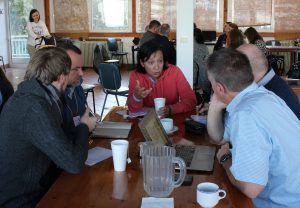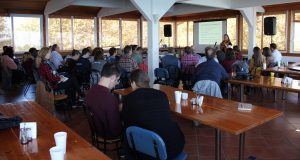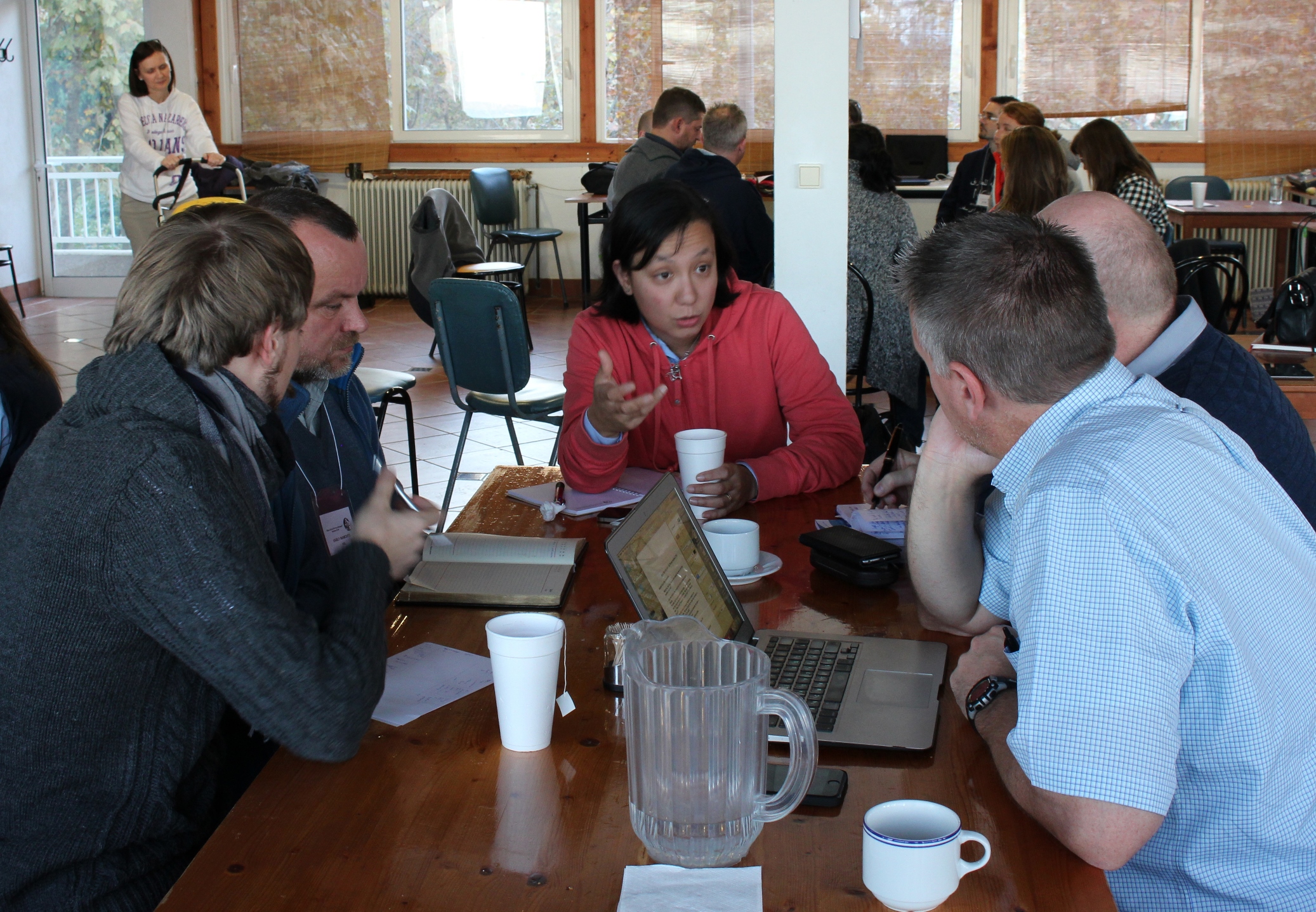By Dorli Gschwandtner
Eurasia Region Communications
Eurasia Region Communications
 “We need to make history. This is our chance, our time. Please pray for us.”
“We need to make history. This is our chance, our time. Please pray for us.”Almost 50 participants from across Eurasia were challenged by these words of Khalil Halaseh, leader of the church in the Eastern Mediterranean Field, in the opening service of a conference addressing the ongoing refugee situation.
Held in Leptokaria, Greece, 31 October to 4 November, the conference, entitled “When Did We See You a Stranger?”, brought together people involved in refugee ministry from the five Eurasia fields that are directly affected by the arrival of refugees in desperate need of support.
Apart from creating space for people to spend time in encouraging each other, sharing and learning from each other, the conference also aimed to synchronize efforts across these fields. The discussions and workshops added depth to the ministries by allowing participants to learn from other practitioners, gain insights for partnerships between NGOs and the church, and deepen an understanding on how to engage with refugees from other faith backgrounds.
In the first seminar of the conference, General Superintendent Dr. Gustavo Crocker pointed out that the Church of the Nazarene has been involved in refugee ministry for a long time.
“It is in our DNA – it’s who we are,” he emphasized. However, engaging in refugee ministry is also somewhat “fashionable” today. Dr. Crocker advised: “My hope is that in these next few days we can move from fashion to passion.”
This passion was undoubtedly stirred as people from different countries shared about their ongoing ministries, showing that Nazarenes are involved at all stages of the journey. Jay Sunberg, Central Europe Field strategy coordinator, said, “We’re just a small group, but we’re touching the crisis the whole way along – and God is in it.”
Listening to stories from other fields and getting a sense of the “big picture” was a great encouragement to all participants, both in the sense of not feeling alone in the struggle as well as in being challenged to carry on the good work. Nell Becker Sweeden, global coordinator for Nazarene Compassionate Ministries (NCM), said: “It was an honour to be here and learn about the various country responses. My hope is that we will go back to our local churches and inspire others to open their hearts to the most vulnerable.”
The conference was held in Greece partly because Nazarene volunteers have been engaged in two refugee camps and one local community in Northern Greece since May. They were joined by missionaries Josh and Shannon Herndon in September, who moved to Greece from Spain in order to establish permanent church presence there. Greece currently houses 50,000 refugees in camps, most of which are not adequate for winter, as Dorothy Tarrant, Nazarene volunteer in Katerini, pointed out on the morning when the first snow appeared on nearby Mt. Olympus. Greece has become a strategic center of Nazarene ministry to refugees.
 Dorothee Morris, who has been serving as a volunteer with her husband and two children and arrived in Greece in July, welcomed the conference’s opportunity of “being able to connect with people from the different fields and looking into ways how we can connect our work throughout the region.”
Dorothee Morris, who has been serving as a volunteer with her husband and two children and arrived in Greece in July, welcomed the conference’s opportunity of “being able to connect with people from the different fields and looking into ways how we can connect our work throughout the region.”The 49 people who attended the conference included field strategy coordinators, volunteer workers, as well as representatives of NCM and Church of the Nazarene International.
Outside speakers included Mike Long of the Free Methodist Church in Thessaloniki, Greece, which has been instrumental in providing connections for Nazarenes to engage in refugee work, and Mario Wahnschaffe, who serves as street evangelist and pastor in a Pentecostal church in Bonn, Germany, and shared his insights on faith conversations with refugees.
Each conference day prioritized prayer times in which each FSC shared requests from his field. Seminars were presented by Dr. Crocker, Kate Bowen-Evans and Rev. Wahnschaffe on the Church’s response in different refugee scenarios and alongside NGO responses as well as in the context of discipling people coming from other faiths.
In the afternoons, participants were able to choose from a variety of workshops on topics such as cooperating with refugees in “co-creating Canaan,” practical advice on working with refugees in holistic ministry, caring for staff and volunteers, and ministering to Yazidis and Muslims.
Following the daily workshops, the conference participants divided into five small groups by fields and engaged in roundtable discussions, reflecting on information and insights gained that day and considering how these could be implemented on a church, district and field level. These discussions provided an excellent space for “practical” ideas and planning beyond the conference. Ian Wills, Northern Europe FSC, concluded in the last session that “the church has gifted windows of opportunity – and we miss too many of them,” but that he goes away very optimistic: “It’s been great to be inspired, challenged and exhausted together!”
In the closing service, Halaseh encouraged all participants to step out in faith and not limit themselves by external circumstances.
“All of us represent churches, districts, fields and the region – all of us represent the Kingdom of God, and we have the passion to reach out, but we need to go further,” Halaseh challenged. “After all this teaching, please go back a different person. We can’t miss this great season that God has given us!”




